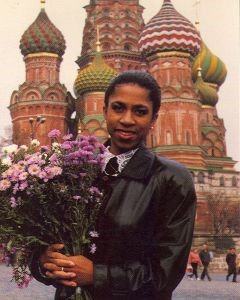Biography
Early Life
In 1988, Yelena Kanga became the first Russian journalist to participate in a foreign-exchange program when she accepted an invitation from the Christian Science Monitor.
Yelena Khanga followed her parents’ and grandparents’ activism and broke barriers as a Russian journalist.
Publishing her family’s story expanded what we know about being Black around the world.
Yelena Abdulaevna Khanga was born in Moscow, Russia, on May 1st, 1962. Her story as an activist begins with her parents and grandparents.
Her father Abdulla Khanga was an independence leader in Zanzibar. Her mother Lily Golden was a Black-Russian intellectual.
Khanga’s maternal grandparents were socialists. Oliver Golden and Bertha Bialek Golden met in jail after a union protest in New York. They were an interracial American couple who migrated to the Soviet Union. They wanted to escape racial discrimination.
Oliver Golden studied agronomy with George Washington Carver. Bertha Golden was a Jewish Russian-English translator. Their daughter Lily heard her father’s discussions with friends W.E.B Dubois, Langston Hughes, and Paul Robeson.
Journalism Career
Yelena Khanga is a journalist and a former host of Russian talk shows.
She graduated from Moscow State University with a degree in journalism. She wrote a thesis on the Black American press.
Khanga began her career as an assistant for the Moscow News. Later, Khanga became an investigative reporter. She covered organized crime, government corruption, and religious freedom.
At the time, these were unusual topics in the Russian press. Khanga’s work as a Black Russian investigative journalist broke barriers for other Black journalists.
Her news coverage and interest in the United States led to her joining the 1988 journalist exchange program. As a reporter from the Moscow News at the Christian Science Monitor, Khanga was notable because she was a Black Russian woman.
Little was known about Black Russians in the United States. Her activism includes interviewing and telling stories of Black intellectuals.
Cultural Awareness
Khanga received the Warren Weaver Fellowship to document her family’s history. She wrote the book Soul to Soul: The Story of a Black Russian American Family: 1865–1992. Khanga tells the story of her family from Mississippi enslavement to modern Russia.
Her writing contributed to a greater understanding of being Black across the globe. Khanga compares her experience as a Black person in the United States. “In Russian culture, I never felt like a stranger in my Black skin,” she writes. “Unlike many African-Americans, I was never made to feel less intelligent, less capable, or less likely to achieve than my white schoolmates.”
She felt insulted by prejudice against African immigrants and against mixed-race children of Africans and Russians. Khanga says, “Something terrible happens to the human soul when you constantly feel you have to prove you’re not a threat to others.”
Writing about her family’s history helped open the way for other stories of families with layered histories.
In 1991, Khanga gathered relatives of her maternal family for a reunion. Her relatives included a Black minister and a Jewish rabbi.
In 2002, Khanga married Russian political analyst Igor Minstusov. They have one child. The couple lives between Moscow and New York.

